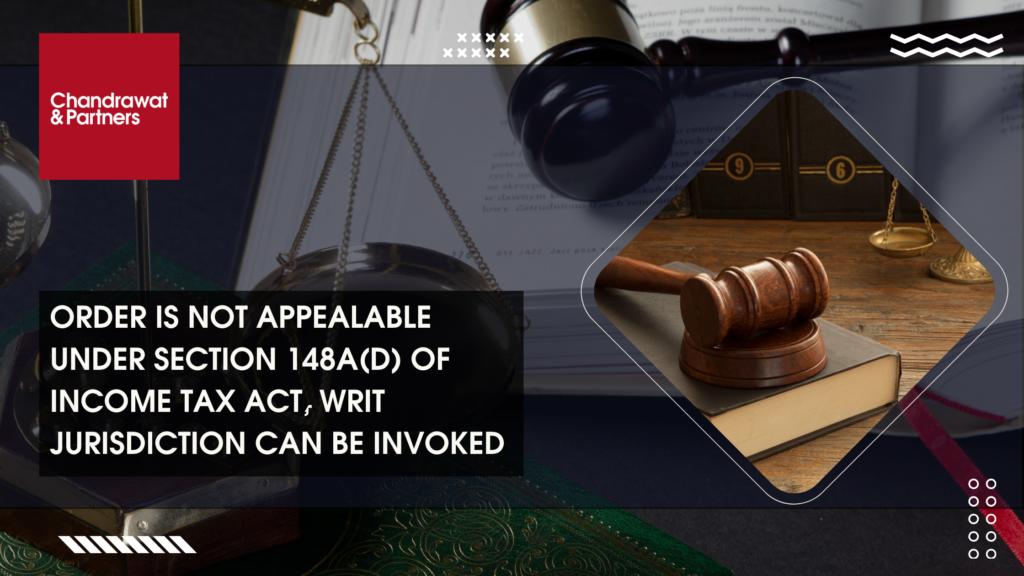Home > Recent Judgements > Order Is Not Appealable Under Section 148a(D) Of Income Tax Act, Writ Jurisdiction Can Be Invoked
Nov 14, 2024

BACKGROUND
In the case between Rakesh Agrawal v. Central Board of Direct Taxes and Others, In this case, the petitioner received a show cause notice under Section 148A(b) of the Income Tax Act on 24.03.2024, as the Assessing Officer (“AO”) suspected concealed income for a specific assessment year. The petitioner appeared before the AO on 31.03.2024, requesting more time to submit a detailed response, but the AO mistakenly noted that a reply had already been filed. On 05.04.2024, the petitioner submitted his reply, yet on the same day, the AO issued an order under Section 148A(d) and a reassessment notice under Section 148 without providing the petitioner with a fair hearing. The Madhya Pradesh High Court found this process flawed, as it disregarded the statutory minimum of seven days for response and issued the order within 30 days of the show cause notice. Since orders under Section 148A(d) are not appealable, the only recourse available was to seek a writ petition. The Court thus set aside the AO’s order, directing that a new hearing be conducted, allowing the petitioner adequate opportunity to respond.
Section 148A(b) of Income tax Act, 1961– Provide an opportunity of being heard to the assessee, by serving upon him a notice to show cause within such time, as may be specified in the notice, being not less than seven days and but not exceeding thirty days from the date on which such notice is issued, or such time, as may be extended by him on the basis of an application in this behalf, as to why a notice under section 148 should not be issued on the basis of information which suggests that income chargeable to tax has escaped assessment in his case for the relevant assessment year and results of enquiry conducted, if any, as per clause.
Section 148A(d) of Income tax Act, 1961– Decide, on the basis of material available on record including reply of the assessee, whether or not it is a fit case to issue a notice under section 148, by passing an order, with the prior approval of specified authority, within one month from the end of the month in which the reply referred to in clause (c) is received by him, or where no such reply is furnished, within one month from the end of the month in which time or extended time allowed to furnish a reply as per clause (b) expires.
ISSUES
- Whether an order passed under Section 148A(d) of the Income Tax Act, 1961, is an appealable order?
- Whether the only remedy available to an aggrieved party against an order under Section 148A(d) is to invoke the writ jurisdiction of the High Court?
- Whether the Assessing Officer (AO) provided an effective opportunity of hearing to the petitioner before passing the order under Section 148A(d)?
- Whether the AO erroneously noted that the petitioner had submitted a reply on 31.03.2024, when the actual reply was filed on 05.04.2024?
- Whether the AO complied with the statutory requirement to provide a minimum of 7 days and a maximum of 30 days for the petitioner to respond to the show-cause notice under Section 148A(b)?
JUDGEMENT
The Madhya Pradesh High Court ruled that no appeal can be made against an order of assessment under Section 148A(d) of the Income Tax Act 1961, but an aggrieved person can seek the writ jurisdiction of the High Court. In this instance, the court believed that effective hearing was denied to the petitioner before issuance of the notice u/s 148 as it was a case of the petitioner’s reply being treated as filed much before it was. They made a more authoritative submission that a hearing should take a minimum of seven days and a maximum 30 days. In this instance, the order was made before the 30 given days had elapsed, which made it unreasonable. Hence, the court remitted the case back to the Assessing Officer and ordered the re-examination of show cause notice giving opportunity to the petitioner for fair hearing.
OBSERVATION
The Madhya Pradesh High Court observed that the AO is in breach of statutory provisions pertaining to serving the petitioner with a reasonable chance to defend himself in respect of the notice served under Section 148 A(b) of the Income Tax Act, 1961. The AO incorrectly noted that the petitioner had already submitted an answer when it was submitted later. Furthermore, the AO issued the order dated 148A(d) within 30 days without allowing the petitioner the minimum statutory period of 7 to 30 days. The Court said that order under section 148 A(d) cannot be appealed and the only remedy available is a writ petition. Consequently, the Court quashed the AO’s order saying that the matter should be re-examined in a manner which allows due process to the petitioner.
For more information or queries, please email us at
enquiries@chandrawatpartners.com




